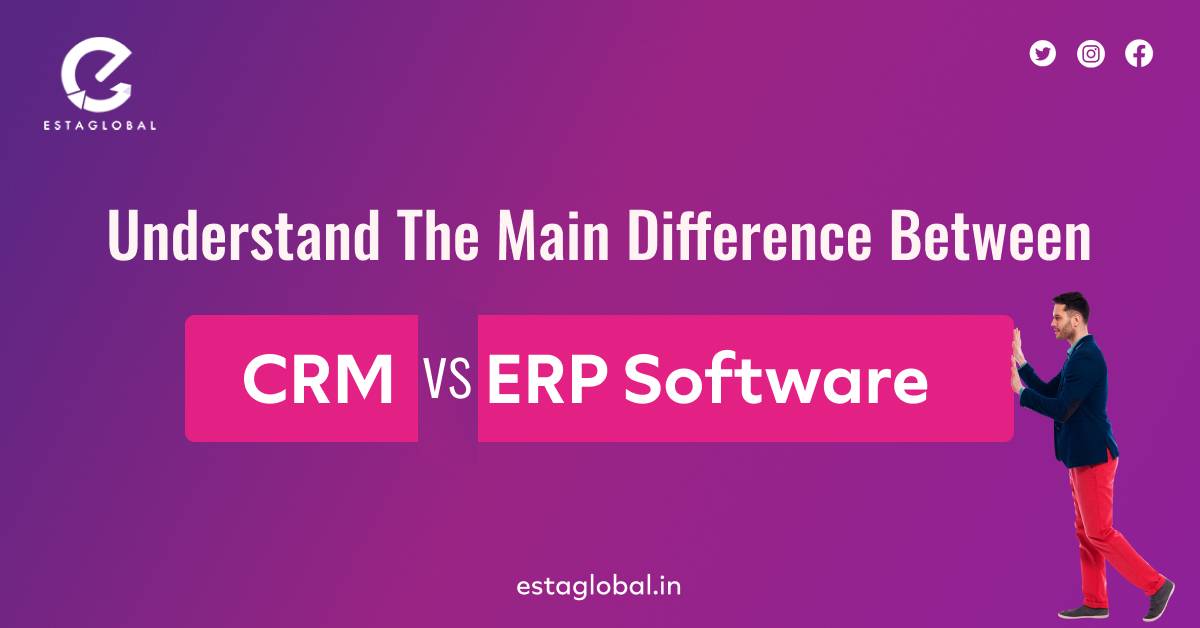The Differences Between CRM & ERP Software
06 Feb 2023- 0

Every IT company or industry needs a system to manage the overall process inside its walls with employees and customers and to accelerate the flow of information. The goal was to create a software program that would support the organization's services and customer assistance.
Many businesses utilize ERP software, but depending on their needs, some may also need a CRM system. Business owners and managers should assess whether investing in CRM software in addition to their ERP system would be beneficial for their companies.
Enterprise Resource Planning (ERP)
Enterprise Resource Planning, or ERP, is a type of software created to make daily operations for businesses, from logistical to administrative, more accessible. It aids in preserving balance with essential corporate functions, such as accounting, human resources, order management, and more. This software is a central hub for streamlining all the information flow and processes within an organization.
Some key ERP features are as follows:
- All of the services required to run the business are integrated using this software.
- These web-based applications are accessible through all interfaces.
- ERP software is in charge of tracking the organization's expansion.
- For managing the resources of an organization, these applications are used.
Customer Relationship Management (CRM)
The software helps the organization in connecting with the ting customers and future potential customers referred to as CRM which stands for Customer Relationship Management. Customer service is managed by this CRM software, which also synchronizes and automates the s. The goal of creating such an application is to nurture and delight prospect leads, which aids the company’s overall performance and increases its sales.
The following are some essential CRM features:
- All customer services are integrated into one place using this software.
- This is utilized to track and manage the organization's operations.
- It aids in improving sales performance.
- It is primarily focused on customers.
Distinction Between ERP and CRM Software
While CRM and ERP systems are similar in that they are both accessible in cloud versions as well as premises and have the potential to be beneficial for data analysis, there are also significant variations between ERP and CRM software.
Although ERP systems web designed to manage an enterprise's entire spectrum of business functions and processes, CRM systems are developed exclusively to handle customer-related business functions and processes. Additionally, CRM software helps with front-office tasks, or the parts of a business that directly deal with clients, like sales. However, business software primarily supports operations carried out by back office or non-customer-facing departments, such as the finance department.
CRM systems frequently offer more advanced customer-related capabilities than those provided by ERP systems since they concentrate on a company's customer relationships.
If company executives feel that their new ERP software's CRM features will be insufficient or if their ERP system's CRM features are not meeting the demands of the organization, they may decide to purchase a CRM system in addition to ERP.
For instance, an organization may need more than the relatively basic CRM features of an ERP system to manage its relationship with its customers if it has thousands of customers.
A Brief Overview
|
S.No. |
ERP |
CRM |
|
1. |
ERP software solutions assist companies in managing their business operations. |
CRM software automates customer communications with the corporation. |
|
2. |
All the processes are streamlined using a centralized system in ERP. |
The only platform for converting customers into potential clients is CRM. |
|
3. |
The super set of SAP is termed ERP. |
CRM is SAP's subset. |
|
4. |
A web-based application is ERP. |
CRM is a web-based solution. |
|
5. |
ERP systems are primarily concerned with cost reductions and organizational expansion. |
CRM systems put a strong emphasis on customer relationships with the enterprise. |
|
6. |
ERP supports back-office activities. |
Front office work is assisted by CRM. |
|
7. |
Examples: NetSuite ERP, Ac Touch, Scoro, etc. |
Zoho CRM, Salesforce CRM, HubSpot CRM, etc. |
Conclusion
Enterprise executives can choose to use CRMs along with ERPs or just use the CRM features of the ERP to address their company's customer relationship demands. Typically, a corporation's size, strategic goals, and data requirements determine whether its investment is required in both an ERP system and a CRM.
Read Also: